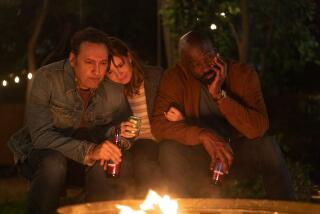‘Mad Men’ recap: Out with a whimper
- Share via
The fifth season of “Mad Men” arrived in March after a seemingly interminable hiatus, and from almost the very first minutes of the premiere episode, “A Little Kiss,” the series has struck a darker, more somber tone. Once moody, “Mad Men” is now clinically depressed. The show has also taken a turn toward obvious and explicit storytelling: The imagery is so blunt it leaves little to interpretation, and the plotting in recent weeks has been unusually clumsy. The “I can’t believe this is happening” moments – Fat Betty, Paul the Hare Krishna, Pauline slipping Sally a Seconal – have been alarmingly frequent.
However, the biggest problem with this season of “Mad Men” has been its lack of narrative momentum. In my opinion, the third season remains the show’s strongest. It tied together the personal and the historical in an unforgettable way, building inexorably toward three cataclysmic events: the JFK assassination, the Drapers’ divorce, and the breakup of the original agency. By comparison, Season 5 has felt rudderless and crowded with intriguing but underdeveloped characters, forgotten story lines and missed opportunities to engage meaningfully with the social changes of the late ‘60s. There have been some wonderful moments along the way, but it all culminates in an episode that’s shocking only because it’s so completely anticlimactic. Who’d expect “Mad Men” to go out with a whimper and not a bang?
In an interview with The Times last week, series creator Matthew Weiner promised this finale would be “orgasmic.” Even for a guy not known for his modesty, this seems like a gross exaggeration: “The Phantom” is more like a sneeze. Fans of this series have come to expect a lot from its season finales – divorces, proposals, pregnancies. Yet the most dramatic things to happen in “The Phantom” are the extraction of Don’s rotten tooth and a brief glimpse of Roger Sterling’s naked rear end. On the bright side, the lack of a tantalizing cliffhanger will at least make the show’s lengthy hiatus easier to endure.
It’s Easter 1967, about a month since Lane’s untimely demise. His death hangs over the agency like a cloud – or haunts it like a phantom, if you prefer. Of course no one has really processed the trauma, or even really tried. Don has been treating his emotional pain the same way he’s tried to remedy that toothache: by dousing it with Canadian Club. Lane’s suicide has conjured memories of his brother Adam’s fate, and he is, quite literally, seeing Adam everywhere – in the elevator, in the art department, at the dentist’s office.
Clearly, Don is experiencing guilt over his indirect contribution to the deaths of both men, and yet outwardly he insists to Joan that there’s nothing either of them could have done to stop it. (Joan being Joan, she actually feels bad for not sleeping with him.) Even though Don thinks he’s being chivalrous by giving Rebecca $50,000 from the company’s life insurance payout, she’s right when she suggests that Don is only doing it to make himself feel better. It doesn’t quite work. Don finally goes to the dentist, where he’s “visited” once more by Adam. “It’s not your tooth that’s rotten,” Adam says. In case you missed it, he’s talking about Don’s conscience.
At home, things aren’t much better. Frustrated by her inability to find work, Megan betrays her friend Emily and asks Don if she can audition for the Butler shoes commercial. We’ve seen Megan’s bratty side before – remember the orange sherbet? – but we’ve never seen her do something wrong. It’s also strange to see her struggling, given how easily everything seems to come to her. Don initially turns down her request. “You want to be somebody’s discovery, not somebody’s wife,” he says rather disingenuously. But then he sits down to watch her screen test and, objectively, he can see Megan’s talent. In the silent, black-and-white footage, she is almost impossibly magnetic. He grins proudly, but the smile quickly fades to a look of concern. If Megan gets the acting career she wants, what will it mean for Don? It’s a lovely, indelible moment in an otherwise forgettable episode. (OK, the dog-humping was also pretty memorable.)
In the final scene, we discover that Megan has landed – or, more accurately, been given – the part in the Butler commercial. Don gives her a good-luck kiss, then walks off into the darkness as a swarm of hair and makeup people touch her up. It harkens back to “Shoot,” the early episode in which Don arranges for Betty to model for a Pepsi commercial as a way of cheering her up. This time around, though, Don isn’t merely indulging his wife, he’s giving her career a vital boost. Don has given Megan what she wants, but in so doing he has somehow fatally, instantly changed their relationship. He wanders into a bar where he’s propositioned by a pair of beautiful women. He raises his eyebrows suggestively, and the credits roll: The old, philandering Don Draper is back. The problem here is the mismatch between the import of the scene – clearly, we’re meant to believe the Draper union is doomed –and its actual emotional impact. At the end of the day, Megan has gotten a part in a cheesy shoe commercial. Surely marriages have endured more critical challenges than this.
Pete has never been particularly likable, but his narcissism and selfishness reached new heights this season, culminating in an afternoon tryst with Beth Dawes just hours before she undergoes shock treatment. (So romantic!) To be blunt, I’ve been rather bored by Pete’s domestic discord this season, mostly because it’s such an obvious replay of Don’s marriage to Betty (the only difference: Pete lacks Don’s charm, good looks, and occasional fits of conscience). His affair with Beth is worse than creepy — it’s tedious. He claims the whole thing has made him realize that his family is “just some temporary bandage on a permanent wound.”
It’s meant to be revelatory, but at this point there’s nothing groundbreaking about marital ennui on “Mad Men.” Last week, Vulture ran a piece about the exceedingly high divorce rate on this show, and I am starting to think all the marital misery isn’t just historically inaccurate, it’s also creatively limiting. Wouldn’t it be more interesting if someone were actually happy for once? I also find it hard to believe that Trudy would be convinced by Pete’s tale of crashing the car into a ditch, or that she’d agree to let him have an apartment in the city. Trudy is nobody’s fool.
Everyone’s marriage might be floundering, but hey, at least Sterling Cooper Draper (Pryce?) is doing well. At the partners’ meeting, Joan announces that the agency has had its best quarter ever. It’s a surprise to the partners, not to mention the audience, since it perpetually seems as if the agency is on the brink of ruin. But then the marketplace is a fickle thing, and a few months of robust business surely can make the difference. The boom means SCDP can finally expand to that elusive second floor, and in another terrific shot, we see the partners in silhouette in their empty but expansive new offices, contemplating what lies ahead. The question hanging over this moment, and the season in general – so vividly relayed in last week’s episode – is whether it’s all worth it.
Stray thoughts:
— Obviously the best thing about this episode was the reappearance of Peggy, who runs into Don at the movies. These two have always been cut from the same cloth, and now they’re professional equals. “Add me to your call list,” Peggy says. Something tells me Don will.
— Peggy’s only been in her new job for a few months, but her wardrobe has already changed for the better. Check out the red power suit!
— During her run-in with Don, Peggy pointedly mentions Megan twice. What does it all mean?
— Leave it to Harry Crane to use Lane’s death as an excuse to complain about his office.
RELATED:
Matt Weiner is the warden of everything
“Mad Men” recap: A woman’s worth
“Mad Men” recap: “A moment before you need more happiness”
Follow Meredith Blake on Twitter @MeredithBlake
More to Read
The complete guide to home viewing
Get Screen Gab for everything about the TV shows and streaming movies everyone’s talking about.
You may occasionally receive promotional content from the Los Angeles Times.





